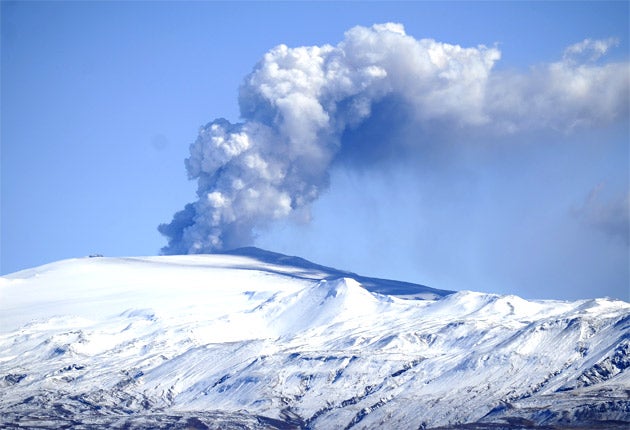Government failed to act on volcanic ash threat, say MPs

The Government failed to plan for a possible volcanic eruption in Iceland that paralysed air traffic in the UK and caused hundreds of millions of pounds worth of disruption despite being warned of the threat, an official investigation into national emergencies has found.
Volcanic ash released from the Eyjafjallajökull volcano in April 2010 led to the closure of airports, the cancellation of flights and the stranding of thousands of passengers around the world, yet the Government decided in 2009 to drop such a potential catastrophe from its assessment of major risks.
A report by the House of Commons Science and Technology Committee said that the lack of planning for the volcanic disruption illustrates how the Government tends to seek scientific advice after a disaster has occurred rather than using it to pre-empt the chaos that can result.
"We are concerned that the Government's attitude to scientific advice is that it is something to reach for once an emergency happens, not a key factor for consideration from the start of the process," the MPs concluded.
The volcanic ash emergency and last winter's swine flu pandemic were both classified as serious "level 2" emergencies that required a government response co-ordinated by a "lead" department and the Cabinet Office Briefing Rooms (COBR) committee. The highest, catastrophic "level 3" emergency directed by COBR alone has not occurred in recent times.
The Cabinet Office makes a national risk assessment of emergency scenarios, such as an outbreak of foot-and-mouth disease or a terrorist incident, but neither a volcanic ash eruption nor the effects of electronic disturbances caused by a solar storm are included in the risk assessment, the MPs said.
"The current approach smacks of closing the stable door after the horse has bolted. Science... must be integral to the whole planning process and unfortunately the Government still hasn't got it quite right," said Labour MP Andrew Miller, who chairs the committee. He added: "It is extraordinary that [in the case of the volcanic eruption] we found ourselves so ill-prepared from the start. There is clearly a lot of work to be done in that area."
The committee considered four emergency scenarios to study how government uses scientific advice. They were the swine flu outbreak, the volcanic ash eruption, a cyber attack and the possible disruption to the electricity grid as a result of a solar storm.
In the case of the swine flu outbreak, the committee criticised the way the risk was communicated to the public, in particular the idea of the "reasonable worst-case scenario" of 65,000 deaths, when in fact the total number who died of swine flu came to 460.
Instead of focusing on the worst case, the Government should in future make it clear that the "most probable scenario" is far more likely to occur, although even this assessment can change over time with new information.
Join our commenting forum
Join thought-provoking conversations, follow other Independent readers and see their replies
Comments
Bookmark popover
Removed from bookmarks